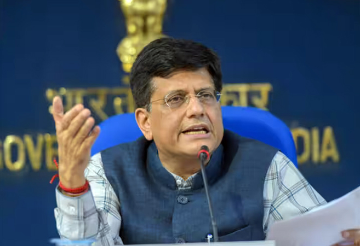
The Horn of Africa, comprising of six (five sovereign states and one de-facto) states: Ethiopia, Eritrea, Sudan, Djibouti, Somalia and the self-governing state of Somaliland, has recently been at the centre of international mediation efforts owing to the persistent instability in the region. Be it the ongoing ethnic and political tensions in Ethiopia, the continuing transnational threat of Al-Shabaab in Somalia, or Sudan’s botched transition, the region is caught in a chronic cycle of insecurity. This has prompted major powers like China, the United States (US), and the United Kingdom (UK) to recently appoint special envoys to the region in an effort to uphold regional security and ensure peaceful settlement of disputes.
On 20 June, an interesting development took place when China sponsored its first-ever Horn of Africa Peace, Good Governance, and Development Conference in the Ethiopian capital of Addis Ababa. The conference followed the appointment of China’s Special Envoy for the Horn of Africa, Xue Bing, in February, adding to Beijing’s diplomatic outreach following a number of high-level Africa sojourn from Chinese diplomats in countries like South Africa, Algeria, Senegal, Tanzania, Malawi, Burkina Faso, and Togo last week. Through the conference, Beijing’s intention was to showcase its growing appetite for crisis diplomacy and to position itself as a provider of regional public goods.
The meeting marked China’s most prominent attempt at promoting itself as a consequential mediator and a security provider in Africa since its mediation efforts in South Sudan in 2014. In the runup to the conference, Xue Bing exclusively framed the meeting as setting the scene for conflict resolution. He personally offered to provide mediation efforts for the “peaceful settlement of disputes based on the will of countries in this region.”
The meeting marked China’s most prominent attempt at promoting itself as a consequential mediator and a security provider in Africa since its mediation efforts in South Sudan in 2014.
This offer was unexpected since Xue, apart from a stint as a junior diplomat in Kenya, has no experience in any African country. Nonetheless, the conference offered China an opportunity to convey its willingness and display its capacity to engage in mediation efforts in Africa.
The Horn - An unstable and complex region
The conference came at a time when the Horn of Africa has become infamous as an unstable subregion with a highly volatile socio-political framework. The region is riddled with insecurities. In 2021, heightened tensions and military clashes engulfed Ethiopia and Sudan over a territorial dispute. A diplomatic row erupted between Kenya and Somalia over disputed maritime territory in the Indian Ocean. On other hand, Ethiopia descended into a civil war with rebels allied to the Tigray region’s Tigray People’s Liberation Front (TPLF). According to the UN Human Rights Council (UNHCR), the military conflict in Ethiopia has resulted in the displacement of over nearly 5.1 million people. Even today, unabated violence and fighting continue in Tigray with an invisible campaign of ethnic cleansing against Tigrayans.
Moreover, the triangular conflict between Ethiopia, Egypt, and Sudan over the construction of the Grand Ethiopian Renaissance Dam (GERD) further raised the prospect of regional instability. In Sudan, military overreach strained the transition to civilian and democratic rule, whereas in Somalia, the Islamist insurgency of Al-Shabaab continues to pose a transnational threat to regional stability.
A combination of macro-economic challenges, poor harvests, and rising prices on international markets, as a result of the war in Ukraine, have resulted in a humanitarian crisis.
Such events have been unravelling at a time when communities in the Horn of Africa are facing a severe food crisis in the aftermath of four consecutive failed rainy seasons in parts of Ethiopia, Kenya and Somalia. Food prices are spiking in many drought-affected areas along with millions of people facing dire water shortages. A combination of macro-economic challenges, poor harvests, and rising prices on international markets, as a result of the war in Ukraine, have resulted in a humanitarian crisis. The UN Office for the Coordination of Humanitarian Affairs (OCHA) estimates that at least 18.4 million people are facing high levels of acute food insecurity and rising malnutrition.
Outcomes of the conference
In such times of turmoil and uncertainty, the fact that Beijing successfully convened such a conference between regional states that are often hostile towards one another is commendable. It reflects China’s economic clout in this part of East Africa, owing largely to its heavy investments in resources and infrastructure. Traditionally, China’s presence in the Horn has focused on trade and investment, but such a stance is evolving in a region that is beset by conflicts and security issues. China’s aim is to couch its security engagement as part of its endeavour to protect overseas assets, civilians, and investments. Therefore, the conference certainly signalled Beijing’s intention to play a larger and more proactive security role in the region.
Given the strategic importance of the Horn, the conference naturally attracted wide-spread attention. But despite much hype, the conference ultimately failed to deliver on its stated aim of discussing mediation efforts. On one hand, the event signalled Beijing’s willingness to sponsor regional dialogue on African security issues. This episode was characterised as abreakthrough moment but in practice achieved very little with mostly rhetorical commitments.
On the other hand, Xue Bing, by the end of the event, acknowledged that the conference discussions “did not touch upon the mediation efforts and nobody raised this issue.”
The complexity and interconnectedness of both intra- and interstate conflicts, along with the pervasive insecurity, renders the task of building durable peace and security in the region rather difficult.
There are certain reasons why mediation efforts were not discussed during the conference. Most of the pressing issues in the Horn of Africa are complicated and intertwined ethnicity, religion, and ill-defined boundary issues. The complexity and interconnectedness of both intra- and interstate conflicts, along with the pervasive insecurity, renders the task of building durable peace and security in the region rather difficult.
Another issue is that in many instances, the rhetoric and reality of mediation may be different. While China’s offer to mediate is a positive gesture, it does not necessarily align with or reflect the needs of people in the region. Regional countries maybe are uninterested in having an external mediator like China call the shots. Many disputes in the Horn are internal, which subsequently raises the question of upholding the principles of non-interference and respect for sovereignty.
In the future, China may help bring conflicting parties to the negotiating table to foster peaceful resolution of disputes and even provide some economic incentives, but won’t take part in the actual negotiations.
U.S. and UK also appoint Special Envoys to the Horn
The dash to appoint special envoys to the Horn of Africa has not been limited to China, with the U.S. and the UK also following suit. The U.S. appointed two Special Envoys in quick succession – Ambassador David Satterfield in January and Ambassador Mike Hammer in June, 2022. Both the appointments were borne out of the realisation that the Horn’s ongoing instability and interlinked political, security and humanitarian challenges demand a sustained focus by the United States.
Vicky Ford, the UK Minister for Africa, pointed out that the UK’s approach would be more ‘bifurcated’ as opposed to China who emphasises the integration of peace-building with economic growth across northeast Africa and the Middle East.
On other hand, the UK announced the appointment of Sarah Montgomery as its Special Envoy to the Horn of Africa and Red Sea on 21 June. Vicky Ford, the UK Minister for Africa, pointed out that the UK’s approach would be more ‘bifurcated’ as opposed to China who emphasises the integration of peace-building with economic growth across northeast Africa and the Middle East. To the contrary, Montgomery’s approach is likely to deal with Middle East’ issues and the humanitarian crisis in the Horn of Africa, separately.
Whether Xue Bing, Mike Hammer or Sarah Montgomery would be successful in making any consequential impact on the ground remains to be seen. The persons appointed as Special Envoy’s are mostly either diplomats or former diplomats. They don’t come with any political backing. Therefore, the kind of future course of action that would be undertaken depends to a large extent upon their individual personalities.
What is certain from China’s foray into conflict mediation in the Horn of Africa is that it sets a precedent to host such regional security dialogues in the future. When an opportunity would present itself in the form of bilateral or multilateral discussions in the future, China would not hesitate to present itself as a peace broker. The biggest takeaway for Beijing is the lesson that convening a meeting like this is low cost and low commitment in terms of ongoing challenges, and is relatively easy to portray in a positive light. However, the task of sustaining an engagement and having a deep, coherent strategy as an external mediator will continue to remain challenging.
The views expressed above belong to the author(s). ORF research and analyses now available on Telegram! Click here to access our curated content — blogs, longforms and interviews.




 PREV
PREV


